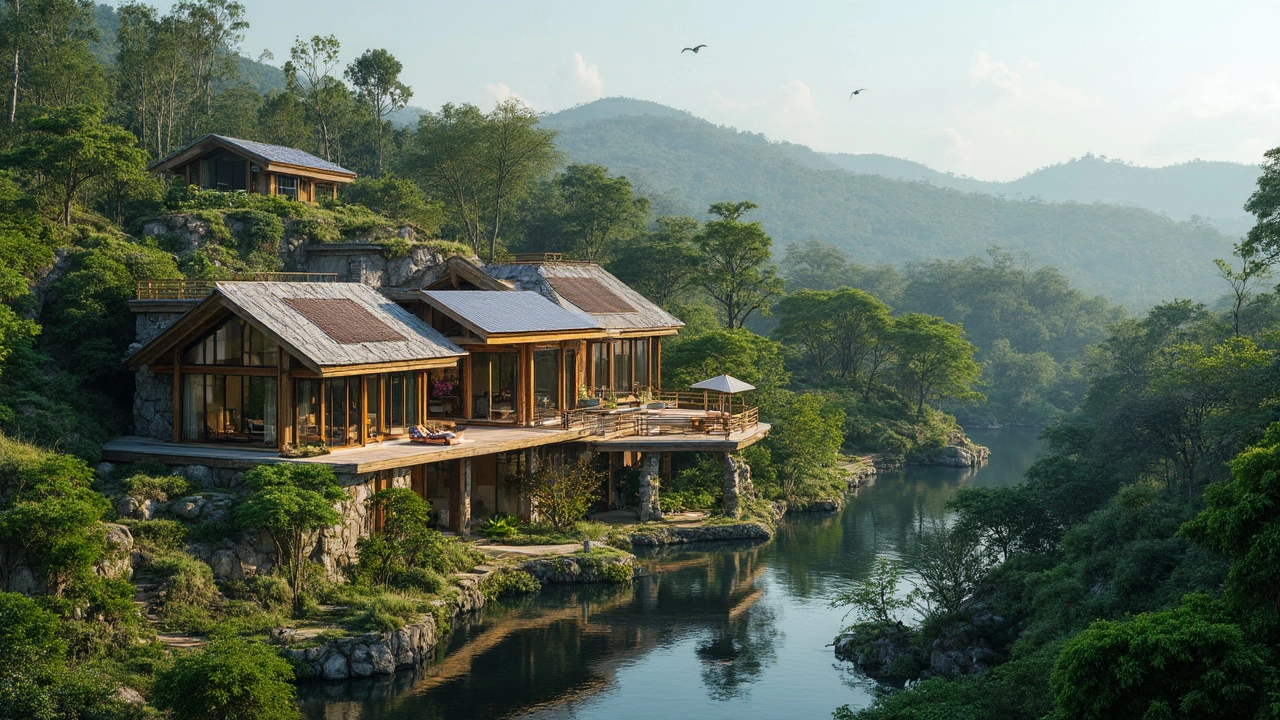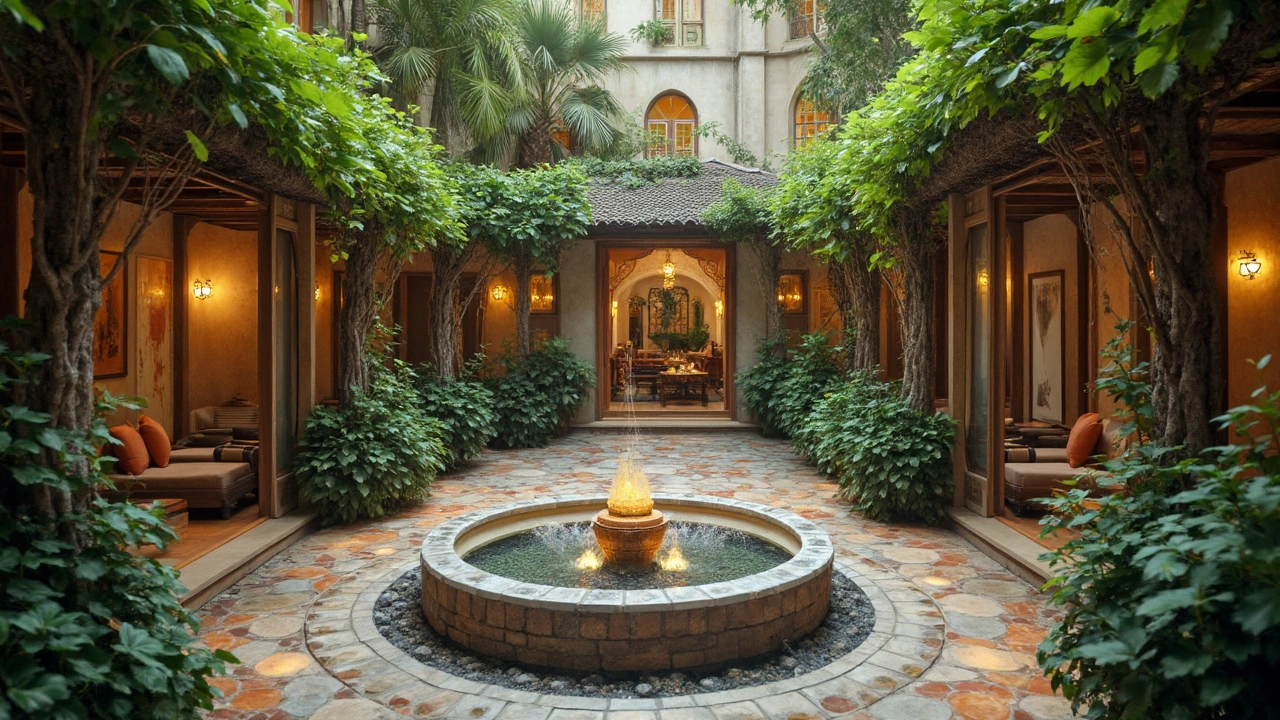Eco-Friendly Hotel Dreams: Building a Green Oasis

- Mar, 29 2025
- 0 Comments
- Aaron Blackwood
So, you're thinking about creating a little slice of eco-friendly paradise, huh? Well, transforming a hotel or resort into an eco-friendly haven is way more than just cutting down a few trees. It’s about being smart right from the get-go.
First up, let's chat about location. The spot you pick should enhance the natural surroundings, not fight against them. Picture a resort nestled in the hills, using the landscape as a natural shield against wind and sun, resulting in lower energy usage. Now that’s smart placement!
Now, about the bones of the place—let’s talk materials. Using reclaimed wood or recycled steel doesn't just give the building a unique vibe, it slashes unnecessary environmental impact too. Every brick, every beam—make sure it's sourced sustainably.
Feeling the heat? Solar panels aren’t just cool to look at; they’re a must-have for any modern eco-friendly accommodation. Pair them with advanced water management systems, like rainwater harvesting or greywater recycling, and you’ve got yourself a setup that’s kind to the planet and the wallet.
And don’t just stop at the building itself. The fittings, furniture, even the food in the restaurant should be locally sourced whenever possible. Supporting local artisans and farmers cuts down on transportation emissions and boosts the community’s economy.
- Choosing the Right Location
- Building Materials and Design
- Energy Efficiency and Water Management
- Local Sourcing and Waste Reduction
- Engaging Guests in Sustainability
Choosing the Right Location
Picking the perfect spot for your eco-friendly hotel or resort is a bit like matchmaking: it needs to fit just right. The right location isn't just about the views (though stunning scenery is always a plus), it's also about making sure your presence respects and enhances the natural environment.
First things first, think about environmental impact. You want a location where you can minimize disruption to the local ecosystem. This means avoiding critical wildlife habitats or areas prone to natural disturbances like flooding.
Being close to existing infrastructure can dramatically drop your carbon footprint. Nobody's a fan of endless construction projects, especially when they consume resources like there's no tomorrow. If your spot already has some roads, utilities, and other essentials, you're already halfway to a sustainable setup.
Consider the best direction or orientation for what you’re building. By positioning your buildings to make the most of natural light and ventilation, you harness these free resources to keep rooms cool in summer and warm in winter without burning through energy with constant heating or cooling.
And hey, don't forget about those aesthetics! Not only will smart siting save on energy, but it also draws you into a harmonious relationship with the landscape. Guests come for the experience, not just a place to lay their heads.
Finally, always remember the community around you. Embrace local culture and ask for input. Local insights can often lead to small but crucial changes, which makes a big difference. Respecting the social and cultural fabric of the area is as important as the environmental side of things.
Building Materials and Design
When we're talking about creating an eco-friendly hotel or resort, the devil is definitely in the details, and it all starts with the materials and design. Let’s face it, nobody wants to stay somewhere that feels like it's harming the planet. So, what's the scoop on making things green from the ground up?
First off, let's think about materials. Recycled and reclaimed materials are a fantastic choice. We’re talking about everything from beachy driftwood to chic, recycled glass tiles. These not only give your place character but also save a ton of resources from going to waste. Using recycled materials can drop building costs by about 20%—a win-win in anyone's book.
Then there's the whole energy efficiency bit. Windows are your new best friend. Well-placed, energy-efficient windows make the most out of natural light, reducing the need for artificial lighting. We're talking about a 10-15% drop in energy consumption just from smart window placement.
Insulation is the unsung hero here. Proper insulation keeps your guests toasty in winter and cool in summer without cranking up energy use. This means picking the right stuff, like insulation made from recycled paper or blue jeans—a fun conversation starter!
Design should always be in harmony with the surroundings. Incorporating green roofs or vertical gardens isn't just for aesthetics; they actually help with natural cooling, provide insulation, and improve air quality. And they’re killer for those Instagram selfies!
To give you a better picture, here’s a quick fact check:
| Material | Benefit |
|---|---|
| Reclaimed Wood | Reduces waste and provides a unique look |
| Recycled Steel | Strong, durable, and conserves resources |
| Green Roofs | Lowers temperature, provides insulation |
| Energy-efficient Windows | Reduce energy usage by 10-15% |
So, with every plank, nail, and screw, you're not just building any hotel; you're crafting a sustainable experience. All these choices add up, making sure guests can enjoy a stay that's comfy, stylish, and easy on Mother Earth.

Energy Efficiency and Water Management
Alright, let's get down to business. If you're dreaming of running an eco-friendly hotel, nailing energy efficiency and smart water management is key. This is where tech meets nature, and they have a pretty cool party.
Start by embracing the power of the sun. Installing solar panels is like having a mini power plant on your roof. They might cost a bit upfront, but they can zap your energy bills down by up to 70% over time. It’s all about being efficient and sustainable.
Thinking about lighting? Ditch the old incandescent bulbs and swap them for LEDs. They use way less juice and last ages, saving you money while reducing your carbon footprint. Motion sensors are another neat trick to keep electricity use in check—lights turn on only when needed.
But it’s not just about power. Water is a precious resource, too. First off, consider installing low-flow fixtures in showers and toilets. These can cut water usage by up to 30% without guests even noticing a difference.
How about collecting rainwater? Set up a system that captures rain to use for landscaping or in toilets. This takes a load off the local water supply and gives you some serious green points. Not to mention, greywater recycling systems take wastewater from sinks and showers and reuse it for irrigation or toilets.
Ever thought of a green roof? Not only does it look cool, but it also improves insulation and manages stormwater. Plus, they can be a unique spot for guests to relax, combining aesthetics with functionality.
To sum it up, combining renewable energy sources with careful water planning isn’t just eco-friendly; it's smart business. Your guests will love knowing that their stay doesn't cost the Earth, and you'll enjoy the cost savings.
Local Sourcing and Waste Reduction
When it comes to making a hotel or resort truly eco-friendly, looking close to home for materials and supplies can be a game-changer. Why? Because local sourcing cuts down on those pesky carbon emissions from long-distance transport. Besides, who doesn't love supporting local businesses?
Start with the obvious: food. Imagine your hotel’s restaurant offering dishes made with veggies picked fresh from a local farm. Not only does this reduce your carbon footprint, but it also supports local farmers and offers guests a taste of genuine, fresh flavors.
Then, think about décor. Using local artisans to craft furniture, art, or textiles gives the place an authentic vibe while ensuring that eco-friendly practices are followed. Plus, guests often love pieces with a story, something no IKEA chair ever came with!
Now let’s tackle waste reduction. It's all about minimizing unnecessary waste at every possible point. One key area is packaging. Go for bulk goods whenever you can, minimizing those single-use plastics. Encourage suppliers to do the same.
A great step is to conduct a waste audit to see where you can shave off excess. Sort your waste to find out how much is recyclable, compostable, or landfill-bound. Armed with that info, you can make more eco-conscious decisions.
It's not just about the big steps. Implement simple practices like using refillable shampoo and soap dispensers, which cut down on those little plastic bottles by heaps.
Take a look at a neat way to visualize how waste can be managed efficiently:
| Waste Type | Action |
|---|---|
| Food Scraps | Composting |
| Plastic Bottles | Recycling or reusing |
| Papers and Cardboards | Recycling and reusing |
By making smart choices and focusing on sustainable resort practices, you not only attract eco-conscious travelers but also create a reputation for responsibility. It’s a win-win for the planet and your bottom line!

Engaging Guests in Sustainability
Getting guests involved in sustainability makes your eco-friendly hotel experience more memorable and impactful. Imagine travelers leaving with a sense of responsibility toward the planet—that’s the goal!
One cool way to do this is by offering workshops. Why not host events like organic cooking classes or sessions on creating natural cosmetics? Guests love hands-on experiences, especially when they're learning to make or do something new.
You can also implement a reward system for guests who actively participate in sustainable practices during their stay. Maybe offer discounts or a free night for those who opt-in for room cleaning less frequently or use refillable water bottles.
Information is power, right? Placing informative signs around the resort about your green initiatives can pique interest and inspire action. Highlighting water-saving techniques or energy usage reduction can make guests more aware of what they can do too.
For families, incorporate fun eco-tours or activities that teach kids (and their parents) about local ecosystems. Interactive experiences like these can turn learning about sustainability into a fun adventure.
And hey, you might want to get a bit techy too. How about an app that guests can use to track their carbon footprint while staying at your resort? This could also include tips for reducing energy use during their visit.
Creating a sense of community around sustainability is also huge. Hosting events like local farmer's markets or swap meets connect guests with local producers, making the whole eco vibe stronger than ever.